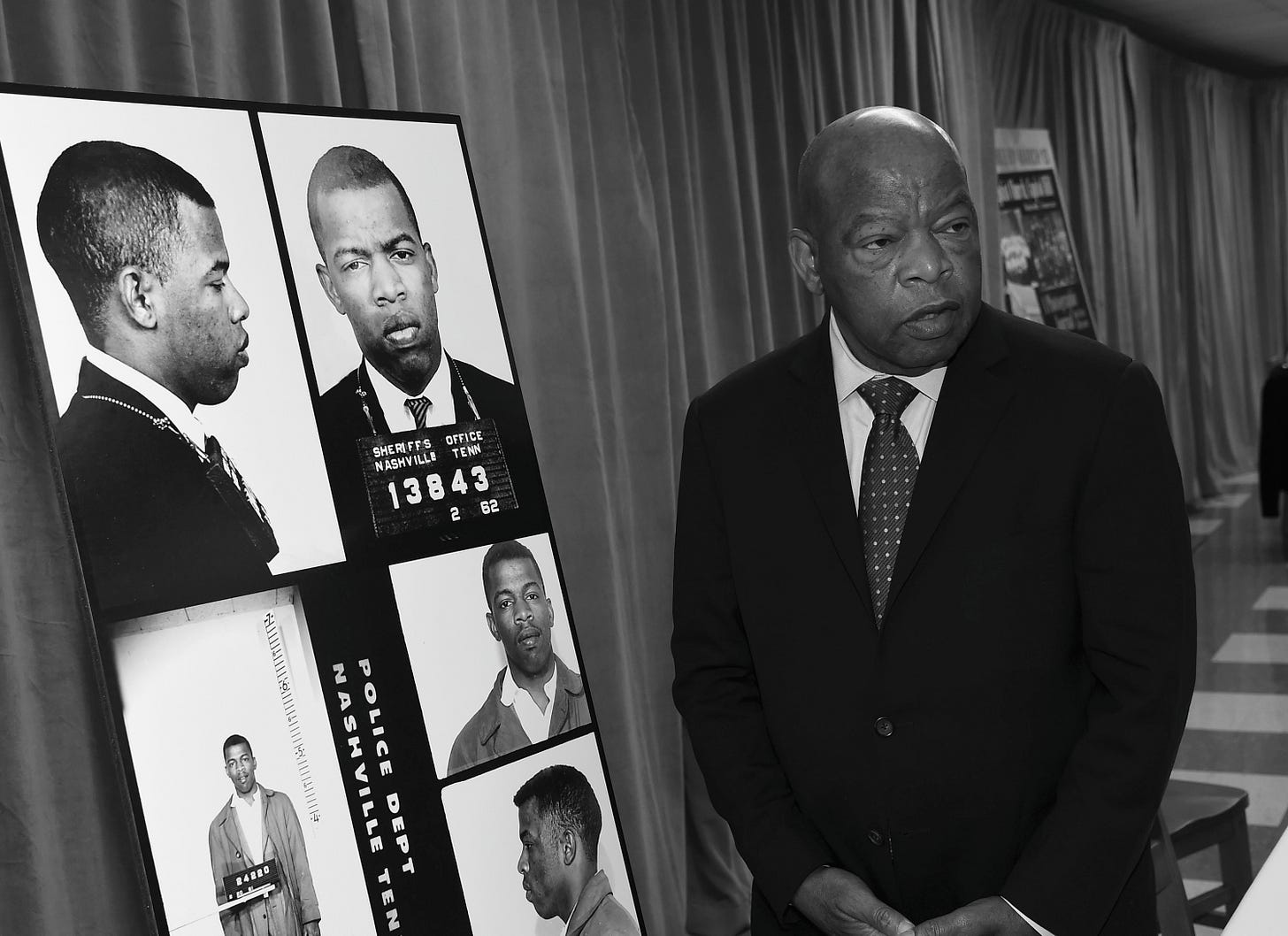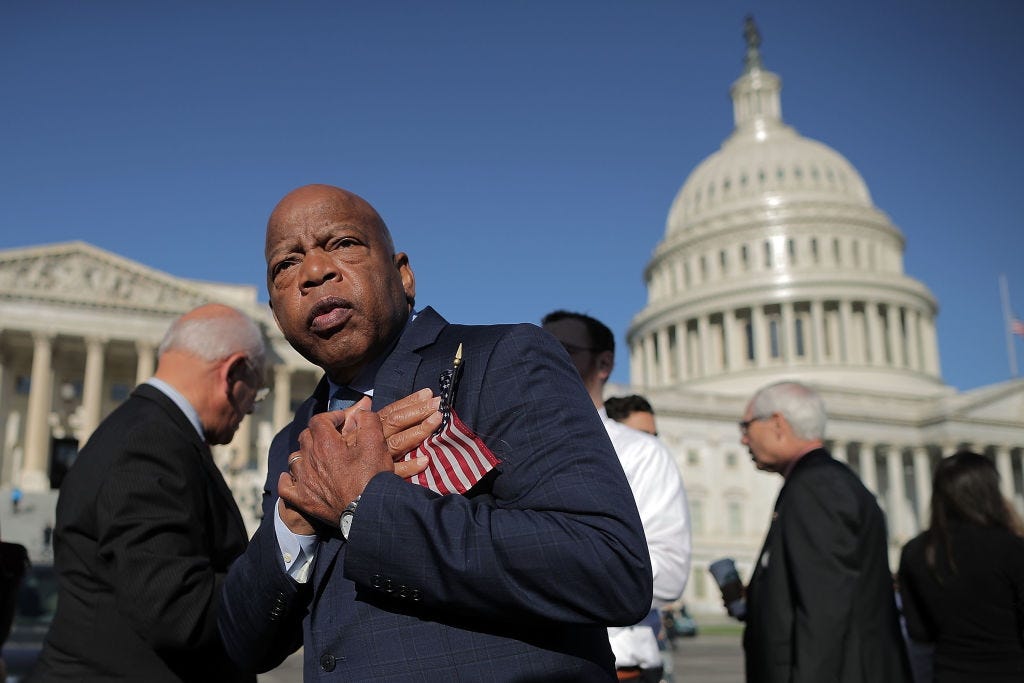John Lewis was born to sharecroppers in Alabama in 1940. Inspired by Martin Luther King Jr.’s radio broadcasts, Lewis joined the civil rights movement at an early age. He engaged in the first mass lunch counter sit-in in Nashville, was an original Freedom Rider in the South, spoke at the historic March on Washington, and served as chairman of the Student Nonviolent Coordinating Committee (SNCC).
During the civil rights movement, Lewis played a pivotal role in the SNCC-led national voting rights campaign. He organized voter registration efforts, community action programs, and various forms of nonviolent protests. On March 7, 1965, he marched with peaceful protesters over the Edmund Pettus Bridge in Selma, Alabama, on what became known as Bloody Sunday. On that day, Alabama state troopers viciously attacked the voting rights champions. This horrific confrontation — which laid bare to the nation the abject violence and terror that Black people endured while simply seeking to exercise their right to vote — coupled with the voting rights campaign overall, directly influenced the passage of the Voting Rights Act of 1965 (VRA) later that year.

Lewis’ work, of course, did not stop there. He was an active civil rights leader and constant champion of racial equality throughout his lifetime. Twenty-one years after the VRA’s passage, he was elected to represent Georgia’s 5th congressional district in the U.S. House of Representatives. In 2010, he was awarded the Medal of Freedom, the highest civilian honor, by President Barack Obama.
Often called the “moral compass of the House,” the congressman served the people of Georgia until his death in 2020, becoming the first Black lawmaker to lie in state in the U.S. Capitol Rotunda.
A National Day of Action
“Ours is not the struggle of one day, one week, or one year,” wrote Congressman Lewis in his 2017 book, “Across That Bridge: A Vision for Change and the Future of America.” “Ours is not the struggle of one judicial appointment or presidential term. Ours is the struggle of a lifetime, or maybe even many lifetimes, and each one of us in every generation must do our part."
Congressman Lewis knew that the fight for civil rights would not end after a single protest, a single bill signing, or a single generation. A valiant and determined freedom fighter, Lewis held fast to his commitment to ensuring that every American has the right to exercise their political power. And now, five years after his passing, the battle to see the promise of that belief through to reality is more important than ever.
With voting rights under constant attacks at the state and federal levels, Congressman Lewis’ legacy is also under threat. Voting rights advocacy was a core piece of the civil rights movement, as leaders understood that without the full and equal right to participate in the democratic process, Black people would never truly have the ability to impact economic, health, or social opportunities and outcomes.
To honor the congressman’s legacy and promote the fight to protect voting rights nationwide, advocacy organizations organized a National Day of Action this week on July 17, the anniversary of Lewis’ death, calling it Good Trouble Lives On. This day of nonviolent action was designed to demonstrate the power of unifying people in a common fight for equality in response to the current administration’s attacks on civil rights. Actions included rallies, press conferences, vigils, marches, teach-ins, voter registration drives, and more.
The John Lewis Voting Rights Advancement Act
In this moment of resistance, as Congressman Lewis’ legacy teaches us, it’s critical to commit to centering the voices of Black communities and building Black political power.
One crucial way to do so is to prioritize the protections that Congressman Lewis fought so hard for in 1965. After years of attacks on voting rights and devastating Supreme Court decisions that have limited the rights the VRA guaranteed, there is still hope for federal legislators to take meaningful action to protect their constituents by passing the John R. Lewis Voting Rights Advancement Act (VRAA).
The John R. Lewis VRAA will restore the VRA’s vital preclearance program, a process that prevents states and localities with a history of discrimination in elections from implementing electoral changes without prior approval from the federal government. The VRAA would also strengthen Section Two of the Voting Rights Act, which prohibits voting practices or procedures that discriminate on the basis of race. The Freedom to Vote Act, Native American Voting Rights Act, and Washington, D.C. Admission Act, which establishes D.C. statehood, are essential complements to the landmark legislation bearing Lewis’ name.
While we celebrated the National Day of Action and honored the memory and legacy of Congressman John Lewis, we know that we have a long road ahead to continue the fight for racial equality at the ballot box — and fulfill Lewis’ vision for a United States where everyone is truly able to make their voices heard.
Good trouble does indeed live on.
How to Make Good Trouble

Missed the National Day of Action? Want to continue to stand up for voting rights and Black communities across the country? Here are a few things you, your family, or your friends can do to empower each other and effect change.
Call your local legislators and ask them to prioritize passing the John R. Lewis Voting Rights Advancement Act in the House and introducing and passing it in the Senate.
Register to vote if you haven’t previously done so. Or, if you have, ensure that your registration information is up to date.
Visit your local library and check out a book on Lewis’ legacy or the civil rights movement to learn more about how his freedom-fighting efforts impacted your rights today.
Talk with your neighbors or friends to make sure they have a voting plan in place for elections this fall.
Research how to volunteer as a poll worker where you live.
Talk to a friend about the importance of voting and how your votes have molded the community you experience every day.
Taking any of these actions — or coming up with additional ways to help empower yourself and others to advocate for increased voter protections — helps fulfill the promise of the Voting Rights Act, and also honors Congressman Lewis’ powerful legacy. Anyone can make a difference, but it will take everyone to make real, lasting change. If not us, then who? If not now, then when?








